Ahriman and the Internet: Is there a third path?
Context:
The following post is prompted by discussion of a recent response I made concerning two essays: the first by Sergei Prokofieff, entitled “The Being of the Internet”, in which he argued that the digital media are carriers of such darkness that they are unredeemable, and the second, a reply to Prokofieff, in an article by Eugene Schwartz entitled “Anthroposophy and Waldorf Education: The Web as Will and Idea”, The reader will likely get more out of the following if both the original essays are read, as well as my original post.
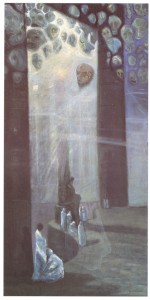
“If one looks behind the being of the computer on this basis, i.e. to the way information is processed and stored, then one discovers that everything is built on the duad which can endlessly and quantitatively be multiplied through repetition and differing compositions.”
also:
“In contrast the Internet or DVD puts everything on the level of purely abstract information that in addition comes in “bites [sic],” (this brings up the picture of Osiris cut into pieces by Typon) and thus is spread amongst mankind in a way towards which no ‘reverent feeling’ is possible.”
I wholeheartedly disagree with this statement. I think Prokofieff is confusing “how” with “what” in this case, and is using the term “abstract information” in a potentially (although likely unintentionally) misleading way. What makes information abstract is primarily the human being’s relationship to it, not the specific storage mechanism. For example, braille is a way of communicating written information that is entirely dependent upon a binary system of bumps and flat spaces. Does this make all information communicated through braille “abstract”; no, the notion is silly.
Simply placing information on a DVD or on the internet does not by itself change the nature of that information: what is required is an understanding of the whole system, which includes also the human (or other) beings doing the communicating, their intentions, their capacities, and so forth. Indeed, it is probably misleading to speak of “the nature of information” at all, because there is no such thing by itself. There is no “information” somehow “out there” independently of a system for which that information becomes useful. Information is always “information FOR” some system which can perceive and act or otherwise change because of this perception. As you can see, the whole concept of “information” is tricky, because the word has many meanings and is used in a variety of contexts.
I think Prokofieff is focusing too intently on the mechanism of storage (“how”). To declare that because information is communicated through digital means, it is therefore rendered into a state “which no ‘reverent feeling’ is possible” is not only a sweeping overgeneralization, but is simply not true; direct experiences of myself and countless others show this to be the case. I have been involved in many purely online interactions which have been transformative in a healthy sense, which have opened my heart to the other (and the other to me), which have broken barriers of abstraction, and which have connected me to another person, or even many people, in ways that I can confidently say further the Christ-impulse. In these moments I have a reverence for the other, for the space in between us, and for the unfolding of something new and completely NOT abstract: a living relationship. I have experienced love flowing through the internet–because human beings made the effort to do so.
“Already today one can find the most awful and defamatory attacks on Rudolf Steiner, Anthroposophy, Waldorf Schools and other institutions connected with Anthroposophy on the Internet. And this widespread effect is not comparable to that of print. There is no doubt that this will increase in future particularly with the publication of the collective works on the internet and DVD because then all alleged “vulnerable passages” in the collective works will be easily and quickly accessible.”
That attacks on Steiner and Anthroposophy and so forth are more common on the internet than in print is true, but I don’t think that this fact supports Prokofieff’s point that that internet is irredeemable. Something about the way Prokofieff states this rubs me the wrong way, as if his motivation is based on a fear of such criticism, and a desire to secretize what may invite such criticism, rather than meeting the criticism in a way that demonstrates in the action itself the worth of anthroposophical wisdom. Steiner is in no way infallible, and he said some things which were wrong, and other things which were ill-phrased or confusing. Thank God: he is human. Anthroposophists should be continually striving to develop and change, and to develop and change anthroposophy as well. Any living system that does not transform with its environment will die, and anthroposophy is no exception to this; it MUST change. Like any living system, some parts of it must decay and fall away, so that new growth can take hold and flower. I say this as a general response to the impulse to keep some information out of the stream of evolution and interaction simply because it is difficult to meet the task of transforming such information, of upholding what is appropriate and letting go what is not. This is not to say that ALL information should be available to all; simply that when the impulse to keep it secret is based on fear I become very suspect.
“If man wants to maintain his autonomy over the world of the computer then he has to differentiate between what objectively offers pure technical aid for his work and where he oversteps the mark behind which, at first unnoticeable, the ahrimanic seduction starts to take control.”
This is an excellent point, and is one that we cannot pay too much attention to. Here I see a glimmer of hope in Prokofieff’s words, because he at least indicates that there is a potential to use technology as a “technical aid”, and that this is different from being seduced by it into a kind of ahrimanic entrainment. But I would say that it is not enough simply to use technology as a “pure technical aid” for one’s work: we should use it as a means to further Michael’s mission, to manifest the impulse of Love, and to transform ourselves in progressive ways.
Now I would like to say that I primarily disagree only with Prokofieff’s conclusion that the internet is irredeemable and that it is solely the province of Ahriman. He paints only a partial picture–a valuable picture, but one that if taken by itself can be misleading. Prokofieff simply doesn’t speak to what human beings CAN do with these technologies, and to what the human being’s task is in relation to these creations. He only states that:
“What has been said does not mean, however, that one should therefore refrain from using a computer or the Internet. They belong to our civilisation and at the same time to the greatest ahrimanic provocations which mankind faces and will have to face increasingly in the future.”
I agree with this statement, in particular that it provides the greatest ahrimanic provocation which humankind has ever seen. The fact that we will have to face this more and more in the future, and he indicates, only makes his omission of any forward looking advice all the more confusing. That the internet (and its related technologies) offers a massive domain within which ahrimanic beings can do their work is something I won’t contest. But I’m not sure that I agree with Prokofieff’s indication that:
“Crucial is however, as with many similar problems, which we are faced with in today’s civilisation, whether man controls the computer and the internet or they man.”
Couching the issue as one of control, and offering only a binary opposition of outomes, seems to play right into the hands of the very beings he is ostensibly seeking to avoid. Attempts at increased control can be just as damaging as complete lack of control. As Prokofieff indicates, it is the introduction of a third option (or many “third options”) that is needed. Not control, and not abandonment. For me the third option is one that arises from the creative transformation of the will around the technologies in question. Steiner has offered us a fantastic bunch of advice on this very point. In my experience one of the most powerful ways of counteracting the ahrimanic tendencies is through the training of Goethean-style observation. This involves awakening a sensitivity to the movement of wholes, to their form, patterning, gesture, and meaning. This is not the space to give details on this way of walking a middle path, but at the very least I can indicate something of what I am referring to by linking to a recent essay on Goethe and a new aesthetic consciousness.
Prokofieff states that:
“Here the attempt is made in purely ahrimanic form to create a worldwide web that connects as many people as possible but in a way that mankind becomes increasingly separated from the cosmos and the hierarchies and thus is bound up with what was described above as an ahrimanic spider web.”
Earlier he quotes Steiner as saying that man will have to unite with the beings of the ahrimanic spider web. My sense is that if such a fate is in store for us (and it does certainly look as if we are going this way), then isn’t it important to build the capacities now that will help us in the future? Shouldn’t we learn how to keep ourselves connected with the impulses of the Michaelic school in the context of the first glimmerings of this spider web that takes the form of the internet today? Why shouldn’t we be active in doing what we can to make it possible to keep our spiritual evolution from future (and present!) stagnation? Should we leave the internet, its development, its adoption, and its various methods of capturing the will and intention of human beings up to those who have no esoteric understanding of what the consequences may be? Should we grant Ahriman his domain, bowing to get out of his way as he reaches his fingers further and further into our modes of perception and communication?


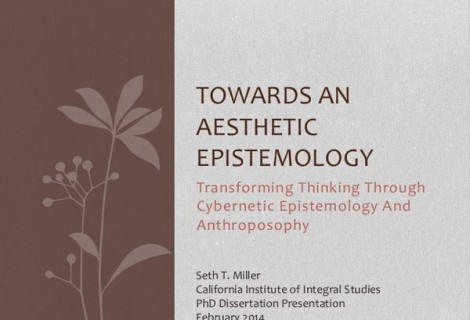
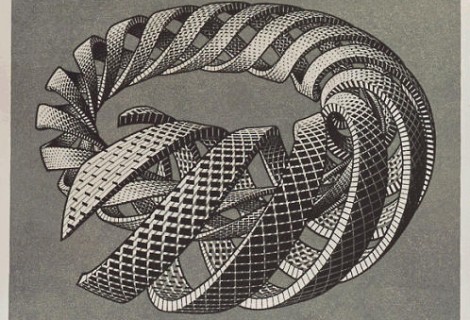
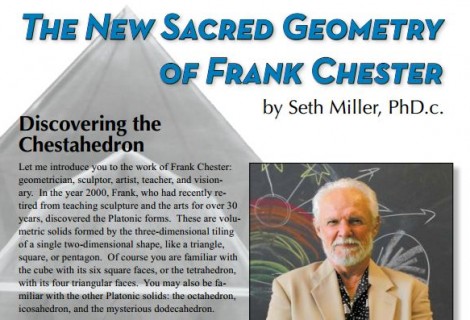
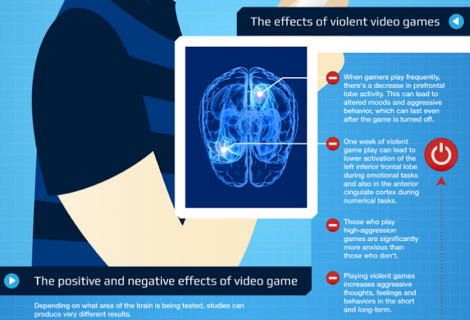
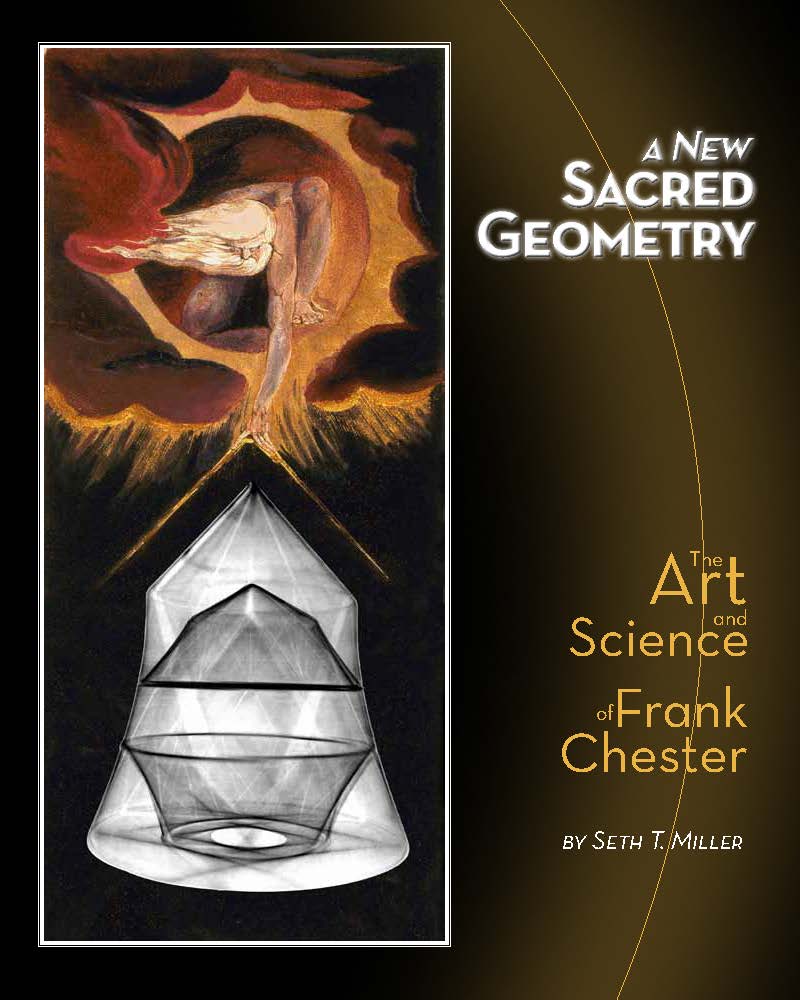
Seth,
You are very articulate.
Some things to consider.
It seems to me that you and Prokofieff are using different modes of language. Prokofieff's essay is very much like a work of art. He creates clear images. In a true work of art the how and the what are interdependent. Pulling a work of art to bits just creates abstract merry-go-rounds.
Placing information into a DVD format is a process that changes the information into exformation, a kind of
seperation of the form from the content so the whole context of the information is changed. Now this has a lot of implications if we a thinking of and experiencing beings instead of notions.
Most if not all your questions in the last paragraph are not open questions, they all contain an 'a priori' so can only lead to a particular understanding without really connecting to the universal understanding and the beings behind those archtypes.
Basiclly you can't use a methodology of absraction (death forces) if you want to find something living
virtual reality equals compression equals death.
Svetlana
Svetlana,
Thanks for your comments and continued engagement. I like what you have to say here, and you are right that my ending questions are all leading questions. In fact, in my original version I actually wrote a sentence at the very end to the effect of "…but my position is made clear by the way in which I have loaded these questions", so I completely recognize what you say. At the same time, Prokofieff seems to have an equally strong opinion on the matter, and doesn't openly or obviously entertain (at least in this article) multiple points of view; he clearly favors the idea that the internet is irredeemable and brings in supporting thoughts and arguments to bolster his case, without presenting contrasting points of view in a similar light… which is the whole reason why Eugene Schwartz wrote his essay and why we are having this conversation now. So I would say that we really don't know whether the internet or digital forms of storage and communication are irredeemable or not. And thus my response is: let us not write them off as such without making a concerted effort to use them in ways that further progressive spiritual unfoldment. It may fail, but my sense is that the effort itself is what is important, not only the result. The other option seems to be one rooted primarily in fear, and seems to lead to letting the ahrimanic forces have their way with human will and attention. I'm still not sure what Prokofieff would actively advocate–what does he think our task actually is with respect to the internet and related technologies? I simply don't know, and thus have to infer based upon his essay. With this in mind, I stand by my position that human beings can use their will and attention through the internet in ways that are beneficial to each other in a spiritual sense.
As to the point of how information is stored, this is very interesting. In my response above I indicate that all information is "information for", which is another way of saying that the notion of "exformation" vs. "information" is, while on the one hand pointing so something very important, also potentially misleading, particularly if we take the difference ontologically, rather than epistemologically. My sense of this is that any kind of communication or transfer of information from one complex system to another involves some kind of "translation". That is, steps are taken — the information is not directly passed between systems in an unmediated and direct way, but always operates through various channels appropriate to the system in question. In the case of human beings we are primarily talking about sensation, and therefore the activity of the astral body. Even face-to-face speech between humans is a far cry from "direct" — so much is involved in the process, and information can often be misconstrued, ahrimanized, taken abstractly, and so forth; we all have this experience. So what I'm saying is that in any situation where information is being transferred between systems, a process of reconstitution (it would be more accurate to say re-creation) necessarily takes place. This process is the manifestation of the activity of the system as a whole, and it is in just this activity where spiritual development can take us further. This means working to transform the astral body, i.e. the transformation of the sense life. Now, I agree with the general thrust of Prokofieff's stance, in that digital media and the mode of information transfer made possible by the internet does make a difference in this process, and that it is easier for ahrimanic forces to gain a foothold when these mediums are used. For this reason we should be more careful about how we use these technologies, because the "seductions of Ahriman" are greater in these realms, and it takes a correspondingly more developed human being to do the transformative work necessary to work towards a Michaelic impulse. But this is just my point; that greater spiritual work is asked of us precisely in this realm–not that the whole realm is irredeemable in principle. Like Prokofieff indicates from Steiner: we should be wary of "dualizing" — my sense is that it would be a mistake to consider this in terms of exformation vs. information, as if these two concepts are not actually quite interdependent and interwoven through and through. But at the same time you point to something profound, in that there is a real link between form and content. Some forms are less suitable for penetration by transformed human will than others, some forms do not carry content well. This is why I recommend working with Goethean observation; it is explicitly a method by which the way form and content are linked in complex systems becomes perceivable, thinkable, and actionable to human beings. It provides a development of spiritual capacities that increases our ability to 'redeem' what we involve ourselves with perceptively through our own activity. The transformation of our perception constitutes the basis for this redemption–it is my understanding that this is part and parcel of Michaelic schooling.
Dear Swetlana
To you the article by Prokofieff may be a work of art – to me it is a regurgitating of what Rudolf Steiner indicated – as is witnessed by all the footnotes. Prokofieff has certainly made an art of publishing – re-publishing of Rudolf Steiner’s work, with hardly a thought of his own in between of what he quotes. Rudolf Steiner used all the newest advances in technology in his time and we are doing the same – perhaps Prokofieff had to remind himself not to get too abstract… which is how his writing comes across – although some call it scholarly – but that does not make it new. Addiction is addiction – with computers, alcohol, drugs, and many other modes, Spiritual Science helps to overcome these through knowledge and practice… I for one do not need an interpretor of Rudolf Steiner’s work – it is in itself implicit.
Hi Seth,
The internet is redeemed when it is used as an instrument for doing Christ's work. It is the "loaves and fishes" on a grand scale.
One could make the same arguments against the printed word. "Primitive" peoples were said to describe the printed words as "little devils". Our Lord avoided all that by "writing in the sand". And so the printed word has furthered the Lord's work.
And is a recorded voice more lively than the printed word? I would say so – it's more "analog". And so what about a video of the person speaking- again more filled with humanness.
The charitable provision of Rudolf Steiner's lectures for free, by people such as James Stewart, is again, a more Christian endeavor. One cannot place a dollar value on spiritual teachings of any kind- the paper, the printing etc. yes, but not the spiritual content.
The downside is that electrotechnology will more and more, make people sick. The eyes are strained, the electromagnetic radiation becomes toxic, and the very nature of the computer machine is far removed from the human organic system, that the individual in close proximity will be affected adversely. Far better to spend more time in the garden- at least put some flowers next to your computer.
If Typhon had put Osiris through a blender, Sergei would have had a much better analogy.
The development of mankind is speeding up, and the internet is part of that, both as a unifying mean but also as a trial for man, as there are many ways to become addicted to it's services, and to become addicted is to loose ones I, and that is part of the Ahrimanian ruse. Ahriman is not evil in it self, but man becomes evil when he can't pass the Ahrimanian trial.
I have written about the Ahrimanian deception inhttp://kimgraaemunch.wordpress.com/2009/04/20/the… , called "The Trap of Materialism", but without mentioning the name Ahriman once in my text, as it's not necessary to analyze the problems we face. As main references I have the lectures from "The Influences of Lucifer and Ahriman" by Rudolf Steiner, and works by Allan Bloom and Christopher Lasch.
Greetings, Kim